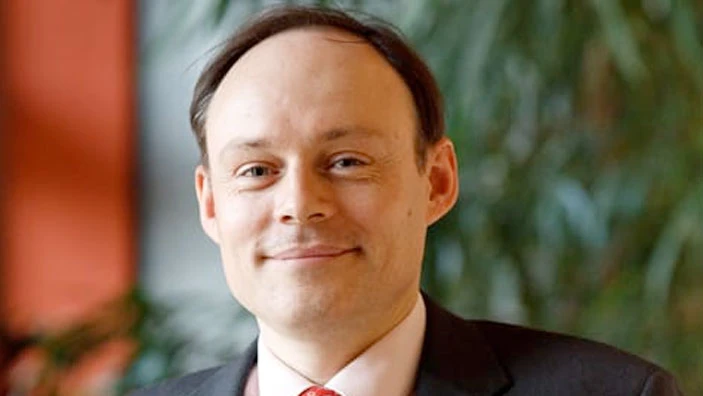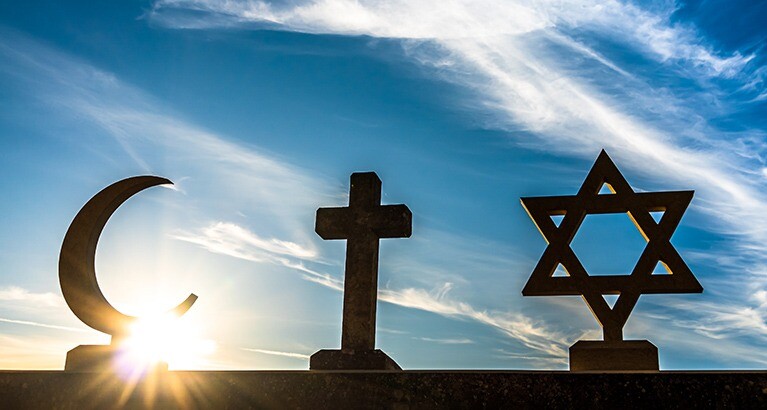Religious principles have been applied to campaigns ranging from the civil rights movement led by the Reverend Martin Luther King to the Jubilee 2000 Debt Relief for developing countries, when Pope John Paul II met with U2 singer Bono to pronounce a “moral vision of what the good of individuals and of the human family demands”.
Professor Michael Pollitt of Cambridge Judge Business School, who has written extensively on the role of faith in climate policy, says climate-change campaigners are now using religion the wrong way by preaching a fire-and-brimstone message of doom rather than Dr King’s uplifting vision of a ‘promised land’.
Using positive messaging instead of apocalyptic language to inspire people to tackle climate change

“Those who are involved in climate policy have adopted a lot of religious language but they don’t use religious methods,” says Michael, Professor of Business Economics at Cambridge Judge. “They present the need for climate action with reference to guilt-inducing apocalyptic scenarios. Climate change, according to them, is something we must stop for the sake of our children or we’re all going to hell.”
“The history of religious movements teaches us that this approach is only a partially successful moral strategy. It may have worked in the 19th century, but it’s not going to work now and we need a much more positive message – we need to frame climate action as a good thing. Religious movements of all denominations are about inspiring people to do the right thing – not brow beating them into doing the right thing. Religions are about hope.”
Thus, in our pandemic-affected era in which politicians said they would ‘follow the science’, Michael believes that scientists could benefit from listening to world religions when it comes to approaching climate change: “If scientists lead the campaign to change people’s attitude to climate change, they seem doomed to be unsuccessful, if only because leading a movement for mass social change is not their primary role in society.”
Professor Michael Pollitt’s background in faith, economics and energy consulting
Growing up in Belfast, Northern Ireland, during the sectarian divide there over many decades (known as ‘the Troubles’), Michael is no stranger to religious division and the challenges of any multifaith approach. He dates becoming a Christian to his first week as an undergraduate studying economics at the University of Cambridge in 1986. “I thought I was a Christian before then, but I made a commitment at Holy Trinity Church in Cambridge during Freshers Week”, which is the first week for students on campus.
“I’m an economist who happens to be Christian,” says Michael, simply. “I’m not seeking to reinvent economics. I’m seeking to use it better. I started writing about economics and faith when I was a graduate student and have been Convenor for the Association for Christian Economics since 2000. I’ve always been in academia and interested in economic policy. I’ve done a lot of consulting, worked with energy regulators, and written pieces for think tanks. The economics I do tries to have impact.”
I’ve always been in academia and interested in economic policy. I’ve done a lot of consulting, worked with energy regulators, and written pieces for think tanks. The economics I do tries to have impact.
Why there is a precedent for religion bringing about societal change
With 84% of the world’s population professing some religious affiliation, focusing this group’s ability to inspire towards climate action would be powerful. Michael’s recommendations include a 2-way dialogue between climate policy makers and religious leaders on effective action. He argues that the only way to bring about change in people’s lifestyles is through some sort of religious or moral conviction.
“The enactment of net zero climate change policy requires both lifestyle and behavioural changes that religious practice and observance can help to change,” he writes in a chapter called “Moral drivers and lenses: policy, economy, faith and climate change”, published in a book published last year called ‘Research Handbook on Energy, Law and Ethics’. “Religious engagement can also help with getting societies to vote for policies which will involve both higher cost, inconvenience and changed behaviour. Religion also affects individuals’ willingness to help others beyond their borders.”
Beyond civil rights and debt relief, the book chapter also highlights the role religion played in the 1989 fall of the Berlin Wall (which happened after a prayer meeting) and in the peaceful transition to democracy from apartheid in South Africa in the early 1990s.
Religious engagement can also help with getting societies to vote for policies which will involve both higher cost, inconvenience and changed behaviour. Religion also affects individuals’ willingness to help others beyond their borders.
Religious texts used to support the need for climate action
From Judaism
Ecclesiastes Rabbah 7 | Cited in ‘Statement by World Jewish Congress’
“When God created Adam, he showed him all the trees of the Garden of Eden and said to him: See my works, how lovely they are, how fine they are. All I have created, I created for you. Take care not to corrupt and destroy my universe, for if you destroy it, no one will come after you to put it right.”
From Islam
Qur’an: 55:7-10 | Cited in ‘Islamic Declaration on Global Climate Change.’
“He raised the heaven and established the balance so that you would not transgress the balance. Give just weight – do not skimp in the balance. He laid out he earth for all living creatures.”
From Christianity
Colossians: 1:16 | Cited in ‘Statement of the Evangelical Climate Initiative.’
“For by Him (Christ) all things were created: things in heaven and on earth.”
Michael is clear that his views are his own and don’t necessarily reflect those of other Christian economists. “I am sure that not all economists will agree with me, let alone all theologians!” he writes in a book chapter entitled “What do theologians need to know about economics,”, published in the 2015 book ‘Theology and Economics: a Christian Version of the Common Good’.
Yet he is determined, as he wrote there, to address “common misconceptions some theologians appear to have about economics, or what I imagine I might have heard down at ‘the theological pub’!”
8 religious perspectives on climate change from Professor Pollitt’s research
1
We do not have a right to consume as much as we want
An important point of contact between religion and environmentalism relates to the idea that religions do not presume or emphasise the importance of economic growth.
2
Focus on long-term thinking
Religion encourages us to see ourselves as part of a continuum of human order, often including prophecy about the future, and warnings of what might happen if behaviour is not altered in the present.
3
Human beings are ‘stewards’ of the created order, managing it for the next generation
Although Christianity, Judaism and Islam all emphasise human superiority in relation to nature, these same religions also make it clear that humans are appointed by God to take care of the Earth on his behalf.
4
No part of human society, including organised religion and scientific communities, are immune from error and corruption
Certain religious groups, for example, the Christian right in America, have been complicit in downplaying the climate crisis. Science also has responsibility because inventions have led to excessive fossil energy use and associated emissions.
5
Obligations on the rich and powerful to help the poor and exercise moral leadership
Religions ask for compassion towards the poor and those least able to help themselves and there is an expectation that the poor will be given the resources they need to survive. As rich countries protect their own environments they export environmental damage to the developing world, whose natural resources are depleted.
6
Climate change policy isn’t the top priority for religions
They emphasise relationships with God, family and neighbours. For climate change to be a religious issue it must be seen in the context of the wider interests of religion in relationships (both human and divine) and in helping the poor.
7
Purely technical solutions to societal problems are challenged and more prescriptive approaches are advocated
Religions are not afraid to say that certain activities are wrong and they should be outlawed in all circumstances. Should environmentalism involve some activities being outlawed in their entirety? Are marginal incentives to reduce damage enough?
8
Interventions can lack real detail
While religion and religious thinkers do write and care about climate change and environmental issues, it is often in the context of identifying them as areas of concern, rather than in giving detailed policy prescriptions about what to do about them.
Global attempts to tackle emissions rely on international relations and free trade
Global collaboration around climate action is often focused on the annual gathering of world leaders at the climate conference held by the United Nations, the so-called COP (Conference of the Parties) meetings.
“Unless we can improve international relations, the achievement of net zero is dead,” says Michael. “Unless we can set aside our political differences enough to realise we have this common, existential threat, climate policy is destined to fail and I think it will gradually begin to unravel. I think unless China, in particular, can be brought back into greater engagement with the global community the achievement of net zero is going to be next to impossible.
“Increased trade protectionism is a real problem for climate change: we need international, unrestricted trade in low-carbon equipment and without it the whole logical superstructure of decarbonisation begins to collapse. Voters aren’t stupid and they realise that if we’re going to keep spending money on net zero without actually achieving it, we’ll eventually have to stop.”
Increased trade protectionism is a real problem for climate change: we need international, unrestricted trade in low-carbon equipment and without it the whole logical superstructure of decarbonisation begins to collapse.
6 ways religion can be engaged in the promotion of greener policies
Michael provides 6 ways he thinks religion can be engaged in the promotion of greener policies.
1
Pressing moral issues need to be bound up with climate change
Changing the amount of greenhouse gas (GHG) emissions by 2050 will not save the starving, the lonely or the oppressed today. Those other issues need to be bound up with climate change if religion is to be engaged on the issue.
2
Focus on areas where religion can make a difference
While religions have little to contribute to debates on the merits of different technologies for addressing climate change, the enactment of net zero climate policy requires both lifestyle and behavioural changes that religious practice and observance can help change. Frugality and simplicity are impacted by religion even if attitudes to climate change policy are not.
3
Unite ‘socially minded’ and ’evangelically minded’ groups
Religion can be focused around 2 equally valid but often very different interests, either making a difference in wider society through social action (such as education, health or environmental issues) or spreading knowledge about personal religious belief (for example conversion). Climate change needs to become an issue that unites religious traditions rather than divides them.
4
Importance of converting the rich and powerful to the cause of climate justice
Society’s rich and powerful have an interest in continuing with the status quo on fossil fuels, and equally, progressing an expensive transition to low carbon energy from which they can benefit. The idea that the Earth belongs to everyone equally is not something that is widely accepted outside of a religious context.
5
Need to engage religious groups on what is worth doing and why
What is needed is a 2-way dialogue between climate policy makers and religious leaders on effective actions. The Civil Rights movement and Jubilee 2000 had a relatively simple lists of demands for action in terms of what individuals could do.
6
Pray for enactment of effective policies on climate change
Scientific information alone will not be enough to get countries to agree to effective action on climate change, nor will admonitions to “listen to the science.” Climate science has been part of the public debate since the 1960s, but we are scarcely any closer to stabilising global emissions at a sustainable level. It will take a miracle to get more than 190 countries to agree to take effective action to reduce GHG emissions to sustainable levels by 2050.
Bringing the poor and marginalised into focus: what religion can teach economists and academics
One of the key things that Christian theology emphasises is a concern for the poor and marginalised.
“I think one of the deep challenges to any academic discipline is whether it’s overly focused on richer, better educated people,” says Michael. “Economics tends to focus on richer countries, most economic analysis is done on richer countries, and it also tends to not do as much work as it should on deep-seated economic problems of poverty – partly because it’s difficult to do that work, but also because there is less funding available.
“As an academic your job is not to be an advocate, it’s not to be an investigative journalist. Your trade is in ideas – it’s not even in winning arguments, it’s more about putting arguments out there and articulating them clearly. If some people find them helpful, that’s great, but I’d rather be right than win. I’d rather have a deeper understanding.”
I think one of the deep challenges to any academic discipline is whether it’s overly focused on richer, better educated people.
Recommendations for future research on links between religion and climate change policy
The links between moral beliefs, religion and climate change policy are poorly researched. There is very little research on how religious belief affects environmentally conscious actions.
“More dialogue is needed between scientists and theologians in order to better understand how religion supports the climate issues and how religious texts can be used in support of climate policy action”, says Michael. “This might ensure that we have policies and associated laws enacted that can deliver the changes to our way of life that are morally and environmentally sustainable.”
Related content
Visit Soundcloud to listen to a podcast interview with Professor Michael Pollitt on the role of faith in climate policy.





